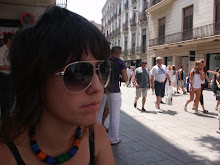Audio publicado en Más Voces : www.masvoces.org

Do you want to be in touch with the Reality?
DOUBLE LIFE
"Succeed in journalism is based in having two studios. Succeed is based in a double life, living in a schizophrenia state. We can be news agency correspondents (…) who obey rules. But, we should keep a little place in our heart and in our mind for us, for our identity, for our personal ambitions" Ryszard Kapuściński
PRIVATIZACIÓN DE CAMPOS DE FÚTBOL EN USERA
Publicado domingo, 20 de junio de 2010
Publicado por
Beatriz Pascual
en
15:04
1 comentarios
![]()
“DIGITAL NON NATIONALITY” USERS
Publicado domingo, 18 de abril de 2010
This late post about the subject is related with the Digital Divide because it is one of the most important topics I have learnt this year and, also, because it is one of the conclusions I acquire from this blogging experience.
The Digital Divide is defined by: The gap or imbalance in people’s access to digital information and technology including physical access, economic resources and skills. However, for me the Digital Divide is me spending two ours to change the background and my brother, a native user, spending fifteen minutes to change it.
We divided Internet surfers calling them “digital natives” or “digital immigrants” users. However, I feel that a new forgotten term should be created: “digital non nationality” users. This generation is located between the two kinds of users.
“Digital non nationality” users are kind of revolutionary users who do not want to subjugate to Internet rules. They have an anarchism way of working because they try to apply literally and without criterion the “offline” rules to the “online” rules. They only want to take the advantages that Internet apparently offers them; they do not tend to depth in other contents
These users tend to be people from seventeen to twenty three years old who grew up knowing the concept of computer but without interacting with it. These users grew up without a physical access to computer that deny them the possibility to develop operational or information skills which could lead to strategic skills nowadays.
These users tend to suffer lack of motivation because they are not able to manage the advantages of the World Wide Web. This digital divide of skills and usage access can create inequality.
This last kind of “digital non-nationality” users will acquire little by little, as they interact with the net, their own identity. As Charles Darwin said: “In the evolution the individuals who survive are the ones who better adapt to the environment, not the strongest or the most intelligent”
Etiquetas:
Digital Divide
Publicado por
Beatriz Pascual
en
14:34
4
comentarios
![]()
PRIVACY IN SOCIAL NETWORKS
Publicado
The virtual world is quite similar to the world of face to face communication. In some way, all of us ask for our little place in the community; anthropology, as individuals, we need to feel part of a group to know who we are. Ortega y Gasset asserts: “Yo soy yo y mis circunstancias, y, si no se salvan ellas, no me salvo yo”. So as to survive, we need to interact with some “circumstances”: our family, our friends as well as people walking in the street. However, we also need to feel that we are an “I”, an individual subject who live in a neo-capitalism society with freedom traditional rights.
These “circumstances” are not equally important to us. We need the community but we prefer to have more feedback with some members than with others. Although we made a profile in a social network and we have 300 friends (for example), it is possible that we would prefer our profile to be less seen by some members. Despite being in a social online public place, we ask for privacy. As in real world we have some different “privacy levels”: there are feelings or situations that we only want to share with a selected group of people.
As it has happened in journalism, social relations in the web are not related any more with gatekeepers. In face to face communication the individual subjects are the ones who filter what they want to show; they control the information in a top-down communication model. However, nowadays, this structure is being mixed with a bottom-up communication model, where, because of internet identities, anyone could know who you are and have a certain idea of your personality, preferences and places you usually visit.
New social relations are being carried out in an equalitarian environment where all people are able to know, in the same conditions, everything you show in your profile or everything other person has seen in your profile. Individual information is not exclusive any more.
However, as I said in the previous post, a community is more than the sum of its parts, but, parts are also important. A community can not be understood without the individuals being aware of whom they are in a group. And this identity is directly related to the information that others know about us. In same way, we are what the others know or not know about our personality.
Identity can not be understand without the subject interacting in a group or without a consciousness of the information shared.
This funny video is about asking for privacy in a public place:
(The image is from "Oficina de seguridad del internauta", and the video cames from youtube)
Etiquetas:
privacy
Publicado por
Beatriz Pascual
en
14:25
0
comentarios
![]()


